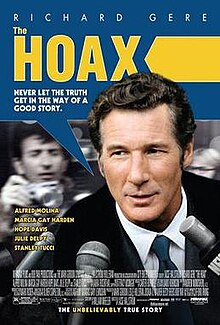The Hoax
| The Hoax | |
|---|---|

Theatrical poster
|
|
| Directed by | Lasse Hallström |
| Produced by |
Mark Gordon Bob Yari Betsy Beers Leslie Holleran Joshua Maurer |
| Screenplay by | William Wheeler |
| Based on |
The Hoax by Clifford Irving |
| Starring |
Richard Gere Alfred Molina Marcia Gay Harden |
| Music by | Carter Burwell |
| Cinematography | Oliver Stapleton |
| Edited by | Andrew Mondshein |
|
Production
company |
|
| Distributed by | Miramax Films |
|
Release date
|
|
|
Running time
|
116 minutes |
| Country | United States |
| Language | English |
| Budget | $25 million |
| Box office | $11,772,461 |
The Hoax is a 2006 American drama film starring Richard Gere, directed by Swedish filmmaker Lasse Hallström. The screenplay by William Wheeler is based on the book of the same title by Clifford Irving. It recounts Irving's elaborate hoax of publishing an autobiography of Howard Hughes that he purportedly helped write, without ever having talked with Hughes. The film was ranked as one of the Top 10 of the year by the Los Angeles Times and Newsweek.
The screenplay was considerably different from the book. Hired as a technical adviser to the film, Irving was displeased with the product and later asked to have his name removed from the credits.
In 1971, publishing executives at McGraw-Hill express an interest in Clifford Irving's novel, Rudnick's Problem. Fake!, his previous book about art forger Elmyr de Hory, had sold poorly. Irving believes he has a breakout work, but the publisher decides against releasing the book after a Life editor deems it unsatisfactory.
Vacationing with his friend and researcher Richard Suskind, Irving is ejected from his hotel at 1 a.m, after eccentric billionaire Howard Hughes arrives and demands the entire building be vacated. Returning to New York City to meet with his publishers, Irving finds he has been reduced to meeting with an assistant. Irving storms into the board room, says his new project will be the "book of the century", and threatens to take it elsewhere. He struggles to come up with a topic fit for his grandiose claim. Seeing a cover story on Hughes, he decides to make him the subject.
Irving tells McGraw-Hill that Hughes has recruited him to help write his autobiography, and shows forged handwritten notes from Hughes as proof. Handwriting experts confirm the notes as genuine, and the publishers strike a $500,000 deal for the book. Irving believes that the reclusive Hughes is unlikely to sue him, and that his eccentricities can be used to deflect any denials of authenticity for the book.
...
Wikipedia
